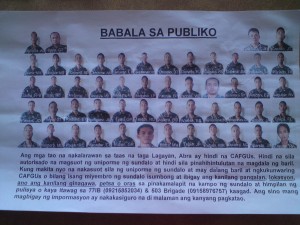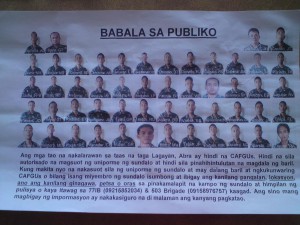By ARTHA KIRA PAREDES
 BANGUED, Abra.—A detachment of the Citizens Armed Force Geographical Unit in Lagayan town was dissolved after its members were found to have been in the employ of local politicians.
BANGUED, Abra.—A detachment of the Citizens Armed Force Geographical Unit in Lagayan town was dissolved after its members were found to have been in the employ of local politicians.
Col. Essel Soriano, commanding officer of the 503rd Infantry Brigade, confirmed the dissolution of the CAFGU detachment in Lagayan town, where the mayor is Jendricks Luna. Jendricks is the son of Rep. Cecilia Seares-Luna and brother of Ryan and Cromwell, who are candidates for mayor of Bangued and Tineg towns, respectively.
Soriano said all 39 CAFGU Active Auxiliaries (CAAs) in the Lagayan detachment had resigned and the detachment commander, T/Sgt. Cesar Zarate, is “under investigation.”
Indebted to pols
CAFGUs members have long been suspected of serving as private armies to politicians, who select and endorse CAFGU members and support their training. CAFGU sources say these militia men become indebted to politicians and agree to be their goons.
Nine of the Lagayan CAFGU members were confirmed to have been part of the entourage that accompanied Cromwell Luna in Tineg on March 23, when they appeared at the kindergarten graduation of the Tineg Central School and fired indiscriminately at the crowd.
Soriano said the CAAs in Lagayan refused to undergo a scheduled training in Dupax, Nueva Vizcaya and just decided to resign. Although they would have been given an option to train in Narvacan, Ilocos Sur, he said the CAAs “never came back.”
But Jendricks’ side of the story is that the CAAs who accompanied his brother asked to be terminated because they were already elected as “kapitan, sanggunian and kagawad.”
Jendricks also questioned the sudden requirement for the CAAs to undergo a refresher training in Dupax, when they are normally trained in Narvacan, so he just told them to “return to their families.”
He also denied reports that the CAAs in his town were members of his private army, citing that at least Lagayan had a separate detachment unlike a neighboring town where the CAAs were detailed in the mayor’s home.
The dissolution of the CAFGU detachment in Lagayan town now leaves Abra with only 15. But these 15 comprise almost half of the 32 CAFGU detachments under the responsibility of the 503rd Infantry Brigade, spanning the provinces of Ilocos Sur, Ilocos Norte, La Union, Abra and Benguet.
In Abra, there are two detachments each in Sallapadan and Lagangilang towns while three are in Licuan-Baay and one each in the towns of Danglas, Tayum, Boliney, Bucay, Luba, Bucloc, San Juan and Manabo.
In 2006, the CAFGU detachment in Tineg was transferred to San Juan, allegedly because the CAAs were on friendly terms with the New People’s Army.
A Nov. 5, 2008 memorandum entitled “Special Report re Update on the Oversight of Tineg, Abra” from then provincial director Senior Superintendent Alex Pumecha stated that “reliable intelligence validated” that Tineg mayor Edwin Crisologo was “politically and materially” supporting the New People’s Army. But Crisologo said such findings were “false” since there are “no NPAs in Tineg” anymore.
In 2007, six CAAs of San Juan were terminated when they were caught at a checkpoint in Talogtog, Dolores town with four civilians carrying 13 rifles. The six were said to have remained loyal to Crisologo despite having been transferred to San Juan. Crisologo denied the CAAs were his goons.
Specific mission
“It is our directive that CAAs will be solely utilized as part of the AFP formation to defend barangays, secure vital installs, intel collection and assist LGUs in community development activities; outside this specific mission/utilization is considered illegal and may be a ground for termination,” Soriano said.
CAFGUs are not allowed to be bodyguards of public officials; only regular forces may serve as escorts, he added.
In a forum on the “Effects of Warlordism and the Existence of Private Armies on National Security” at the National Defense College of the Philippines on Jan. 27, Brig. Gen. Francisco N. Cruz, commanding general of the AFP Civil Relations, said local government units “participate” and are “consulted in the selection of CAAs” then “deployed and tasked to protect their own community.”
But a CAA member interviewed for this report said that because it is the local chief executive who decides who can train as CAFGUs, these CAFGUs become indebted to politicians and susceptible to “temptations.”
“Some CAFGUs agree to be goons even without extra pay because of their utang na loob (debt of gratitude) to the mayors for recommending them,” the CAA source said. CAAs subsist on their P90 per day allowance and most CAAs agree to be goons without any additional monetary reward.
Legal, illegal CAFGU detachments
As far as Abra is concerned, the CAA source says that CAFGU detachments can be either “legal or illegal,” with the legal referring to CAAs who really combat insurgency, and illegal referring to CAAs who serve as goons.
Arms issued to each of them range from M-14, carbine or Garand, which they are required to leave at the detachment. When CAFGUs join politicians as their goons, they are usually issued “high-tech” guns, the source said.
The source added that in legal detachments where the NPAs are active, especially in Tubo town, CAFGUs have shown they could be capable of protecting their communities from NPA attacks because they are well-trained.
“We are trained by colonels and generals,” he said, which means that those who served as goons have received quality training. This is also why local officials lobby to have people of their choice trained as CAFGUs.
Under the Constitution, Section 4 Article XVI, the Citizen Armed Forces are mandated to “undergo military training and serve the state as may be provided by law.”
It is with this situation that Abrenians have come to define PAGs, which originally meant private/partisan armed groups as public armed groups.
A PAG as defined by the Philippine National Police is an “organized armed group of two or more persons with legally issued or illegally possessed firearms for purpose of sowing fear and intimidation for the advancement and protection of vested economic and/ or political interest of a public official or private individual.”
In Abra, Soriano said they are still looking into reports where CAAs serve as bodyguards of officials running for public office. “The problem is, they are wearing the uniform (when they join politicians for their campaigns), he said.
